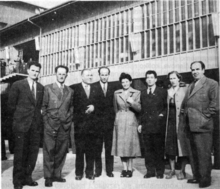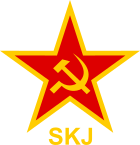6th Congress of the Communist Party of Yugoslavia
The 6th Congress of the Communist Party of Yugoslavia (Serbo-Croatian Latin: Šesti kongres Komunističke partije Jugoslavije, Cyrillic: Шести конгрес Комунистичке партије Југославије) was held from 2 to 7 November 1952, in Zagreb. The Congress was attended by 2,022 delegates who represented 779,382 members of the Communist Party of Yugoslavia. Beside the elected delegates, the Congress was attended by around 400 guests – political, social and public workers from the whole Federative People's Republic of Yugoslavia, as well as delegation of foreign communist and socialist parties.


The Congress
At this Congress, there were reformist changes in the party. A new Statute has been adopted by which the name of the party has been changed to League of Communists of Yugoslavia (Serbo-Croatian Latin: Savez komunista Jugoslavije, Cyrillic: Савез комуниста Југославије). Independence of basic party organizations and lower ranks was strengthened, and candidacy period for admission to the Party was abolished, as well as candidacy period for members of the Central Committee. The Congress also decided that the People's Front of Yugoslavia (NOF/НОФ) would be transformed into a mass political organization and renamed the Socialist Alliance of Working People of Yugoslavia (SSRNJ/ССРНЈ).
During the work of the Congress two reports were submitted. The first report, titled "Struggle of the communists of Yugoslavia for socialist democracy" was submitted by Josip Broz Tito, while the second report, titled "About the proposal of the new Statute of the Communist Party of Yugoslavia" was submitted by Aleksandar Ranković.
At the end of the Congress, a new Central Committee consisting of 109 members, and a new Central Revision Commission consisting of 23 members, were elected. At the first session of the Central Committee after the Congress, Josip Broz Tito was elected as the Secretary General of the League of Communists of Yugoslavia. At the same session, members of the Executive Committee and the Secretariat of the Executive Committee were elected.
See also
- 19th Congress of the Communist Party of the Soviet Union, held from 5 to 14 October 1952.
Sources
- Borba komunista Jugoslavije za socijalističku demokratiju – VI kongres Saveza komunista Jugoslavije. "Kultura" Beograd 1952. godina.
- Pregled Istorije Saveza komunista Jugoslavije. "Institut za izučavanje radničkog pokreta", Beograd 1963 godina.
- Hronologija Radničkog pokreta i SKJ 1919–1979. "Institut za savremenu istoriju" Beograd i "Narodna knjiga" Beograd, 1980. godina.
- Istorija Saveza komunista Jugoslavije. Istraživački centar "Komunist" Beograd, "Narodna knjiga" Beograd i "Rad" Beograd, 1985. godina.
